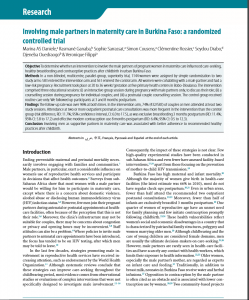
Ending preventable maternal and perinatal mortality necessarily involves engaging with families and communities. Male partners, in particular, exert a considerable influence on women’s use of reproductive health services and participate in decisions that affect health outcomes. Surveys from subSaharan Africa show that most women with a male partner would be willing for him to participate in maternity care, except where there is a concern about domestic violence, alcohol abuse or disclosing human immunodeficiency virus (HIV) infection status. However, few men join their pregnant partners during antenatal or postnatal appointments at healthcare facilities, often because of the perception that this is not their role. Moreover, the clinic’s infrastructure may not be suitable for couples, there may be concerns about congestion or privacy and opening hours may be inconvenient. Staff attitudes can also be a problem. Where policies to invite male partners to antenatal care appointments have been introduced, the focus has tended to be on HIV testing, after which men may be told to leave.
Burkina Faso has high maternal and infant mortality. Although the majority of women give birth in health-care facilities (the latest estimate was 66% in 2010), most do not have regular check-ups postpartum. Even in urban areas, fewer than half attend the recommended two outpatient postnatal consultations. Moreover, fewer than half of infants are exclusively breastfed 3 months postpartum. One quarter of women of reproductive age have an unmet need for family planning and few initiate contraception promptly following childbirth. These health vulnerabilities reflect women’s social and economic disadvantages in a country that is characterized by patriarchal family structures, polygyny and women marrying older men. Although childbearing and the care of young children are considered female domains, men are usually the ultimate decision-makers on care-seeking. However, male partners are rarely seen in health-care facilities and have scarcely any contact with health workers, which limits their exposure to health information. Older women, especially the male partner’s mother, are regarded as experts on infant care and feeding. Traditionally, in addition to breast milk, neonates in Burkina Faso receive water and herbal infusions Opposition to contraception by the male partner is often cited as an obstacle and is associated with lower contraception use by women. Two community-based projects involving men have been initiated in the country but rigorous evaluations have not been published.
The aim of our study was to determine whether an intervention designed to involve the male partners of pregnant women in Burkina Faso in facility-based maternity care influences care-seeking and healthy practices after childbirth. Our hypothesis was that the intervention would increase postnatal care attendance, the duration of exclusive breastfeeding and the use of postpartum contraception.